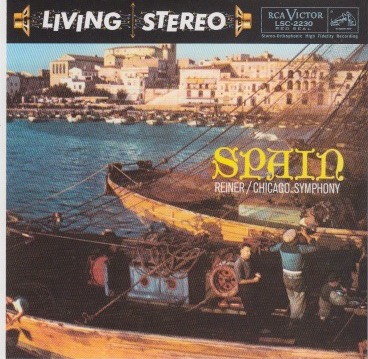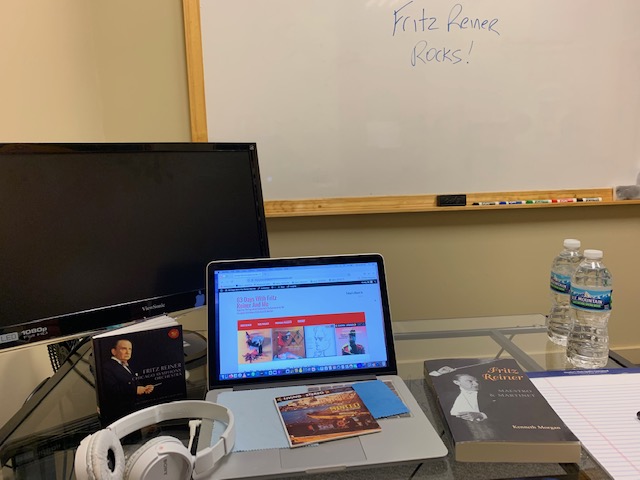
Although I’m sure this album of music by Spanish composers probably follows Iberia (Day 28), I’m generally not a fan of such compilations. I don’t know why.
Maybe it’s because, with rare exceptions, I would rather hear a country’s (or region’s) music in snippets – for example, Scottish reels or Irish jigs or American heartland or Russian folk – interwoven among other passages of music. Like, they’re clever asides, a nod to a composer’s favorite type of music, pieces of music that – scattered here and their like diamonds thrown on the ground – I can savor them as I find them and pick them up.
Don’t get me wrong. I dig the music of other countries. Frankly, most of what I’ve heard for the last 10-15 years in my Classical music explorations is from countries other than America. I mean, when Mozart and Beethoven composed their music, America was a baby. We didn’t really have music of our own. When Bach composed his music, America didn’t even exist. So, what I was hearing is music from Germany or Austria, which occasionally referenced other European countries.
But I don’t really own any purely Scottish music, for example. Or Irish music. Or Greek music. For the same reason why I couldn’t listen to all of Bach’s music performed on period instruments (the harpsichord made my teeth itch), I can’t listen to entire albums full of reels or jigs or Russian folk music. Not unless it’s so marvelously composed that it sparks my imagination, gives my mind a place to visit.
An exception is the superb modern-day songwriter Loreena McKennitt, who often weaves magical musical tales combined with ethereal vocals. Her album An Ancient Muse, for example, features tracks of music that “came from the music of Greece, Turkey, the Middle East and the Far East,” according to its entry on Wikipedia. I saw Ms. McKennitt on that tour. It was a mystical, magical evening.

So I can definitely appreciate music that evokes emotions or borrows whole cloth from other countries/regions.
But, if Loreena McKennitt had released an album of just Celtic folk songs, I might be less intrigued. In fact, I know I’d be less intrigued. It’s her ability to weave various songs and sounds and emotions and lyrics into an entire performance that makes what she does so special to me.
Back to Spain, today’s album of Reiner-conducted music.
The Objective Stuff
According to his entry on Wikipedia,
Pantaleón Enrique Joaquín Granados Campiña (1867-1916), commonly known as Enrique Granados, was a Spanish composer of classical music, and concert pianist. His most well-known works include Goyescas, the Spanish Dances [es], and María del Carmen.
In 1911 Granados premiered his suite for piano Goyescas, which became his most famous work. It is a set of six pieces based on paintings of Francisco Goya. Such was the success of this work that he was encouraged to expand it. He wrote an opera based on the subject in 1914, but the outbreak of World War I forced the European premiere to be canceled. It was performed for the first time in New York City on 28 January 1916 and was very well received. Shortly afterwards, he was invited to perform a piano recital for President Woodrow Wilson. Before leaving New York, Granados also made live-recorded player piano music rolls for the New-York-based Aeolian Company’s “Duo-Art” system, all of which survive today and can be heard – his last recordings.
The delay incurred by accepting the recital invitation caused him to miss his boat back to Spain. Instead, he took a ship to England, where he boarded the passenger ferry SS Sussex for Dieppe, France. On the way across the English Channel, the Sussex was torpedoed by a German U-boat, as part of the German World War I policy of unrestricted submarine warfare. According to witness Daniel Sargent, Granados’s wife, Amparo, was too heavy to get into a lifeboat. Granados refused to leave her and positioned her on a small life raft on which she knelt and he clung. Both then drowned within sight of other passengers. However, according to a different account from another survivor, “”A survivor of the 1916 torpedo attack on a Cross channel ferry, Sussex, recognised Spanish composer Granados in a lifeboat, his wife in the water. Granados dived in to save her and perished. ” The ship broke in two parts, and only one sank (along with 80 passengers). Ironically, the part of the vessel that contained his cabin did not sink and was towed to port, with most of the passengers, except for Granados and his wife, who were on the other side of the boat when it was hit. Granados and his wife left six children: Eduard (a musician), Solita, Enrique (a swimming champion), Víctor, Natalia, and Francisco.
Wow.
Gee whiz. Now I feel horrible. He was only 49 and had just performed a piano recital for President Woodrow Wilson. He had his whole life ahead of him. Damn.
From its entry on Wikipedia,
Goyescas is an opera in one act and three tableaux, written in 1915 by the Spanish composer Enrique Granados. Granados composed the opera to a Spanish libretto by Fernando Periquet y Zuaznabar with melodies taken from his 1911 piano suite, which was also called Goyescas. The opera was first performed at the Metropolitan Opera in New York City on January 28, 1916.
The Intermezzo from the opera became a popular independent concert piece. It is performed in arrangements for orchestra, and for cello and piano.
Granados was inspired to write his popular piano suite by the paintings of Francisco Goya. After the enthusiastic response to the piano work, he was encouraged to compose the opera by Ernest Schelling, an American pianist who premiered the suite in the U.S.
Regarding Goyescas, the composer wrote, “I am enamored with the psychology of Goya, with his palette, with him, with his muse the Duchess of Alba, with his quarrels with his models, his loves and flatteries. That whitish pink of the cheeks, contrasting with the blend of black velvet; those subterranean creatures, hands of mother-of-pearl and jasmine resting on jet trinkets, have possessed me.”
The opera was based on themes from the famous piano suite of 1911, which he orchestrated and augmented to form a three-scene work. The libretto had to be fitted to existing melodies, the reverse of the usual way of writing an opera. Though the opera is rarely performed, the piano suite forms part of the standard Romantic piano repertoire.
The success of the Met premiere of Goyescas led indirectly to Granados’s death. He was invited by President Woodrow Wilson to perform a piano recital at the White House, causing him to postpone his return to Spain. Granados and his wife lost their lives on March 24, 1916 when their ship, the French steamer Sussex, was torpedoed by a German U-boat in the English Channel.
Enrique was 48 when he composed this piece of music.
Other recordings on this album are by Manuel de Falla 1876-1946), Isaac Albeniz (1860-1909).
From his entry on Wikipedia,
Manuel de Falla y Matheu (1876-1946) was a Spanish composer and pianist. Along with Isaac Albéniz, Francisco Tárrega, and Enrique Granados, he was one of Spain’s most important musicians of the first half of the 20th century. He has a claim to being Spain’s greatest composer of the 20th century, although the number of pieces he composed was relatively modest.
From its entry on Wikipedia, ,
La vida breve (Spanish Life is Short or The Brief Life) is an opera in two acts and four scenes by Manuel de Falla to an original Spanish libretto by Carlos Fernández-Shaw. Local (Andalusian) dialect is used. It was written between August 1904 and March 1905, but not produced until 1913. The first performance was given (in a French translation by Paul Millet) at the Casino Municipal in Nice on 1 April 1913. Paris and Madrid performances followed, later in 1913 and in 1914 respectively. Claude Debussy played a major role in influencing Falla to transform it from the number opera it was at its Nice premiere to an opera with a more continuous musical texture and more mature orchestration. This revision was first heard at the Paris premiere at the Opéra-Comique in December 1913, and is the standard version.
From its entry on Wikipedia,
El sombrero de tres picos (The Three-Cornered Hat or Le tricorne) is a ballet choreographed by Léonide Massine to music by Manuel de Falla. It was commissioned by Sergei Diaghilev and premiered in 1919. It is not only a ballet with Spanish setting but one that also employs the techniques of Spanish dance (adapted and somewhat simplified) instead of classical ballet.
From his entry on Wikipedia,
Isaac Manuel Francisco Albéniz y Pascual (1860-1909) was a Spanish virtuoso pianist, composer, and conductor. He is one of the foremost composers of the Post-Romantic era who also had a significant influence on his contemporaries and younger composers. He is best known for his piano works based on Spanish folk music idioms.
Transcriptions of many of his pieces, such as Asturias (Leyenda), Granada, Sevilla, Cadiz, Córdoba, Cataluña, Mallorca, and Tango in D, are important pieces for classical guitar, though he never composed for the guitar. The personal papers of Albéniz are preserved in, among other institutions, the Biblioteca de Catalunya.
I can’t find references online (on Wikipedia, at least) for the last three compositions from Albeniz. Doesn’t really matter, though. Who the hell am I in the grand scheme?
This entire album (every performance) was recorded in Orchestra Hall on April 26, 1958. Reiner was around 70 when he conducted the CSO for this performances.
The Subjective Stuff
Recording quality: 5 (for all compositions)
Overall musicianship: 5
CD booklet notes: 2
CD “album cover” information: 3.5 (lots and lots of really tiny print, but not very in-depth)
How does this make me feel: 3.5
I had to listen to this several times all the way through, each time setting aside my preconceived ideas that this was all “Spanish music” and I actually began to enjoy it. I didn’t hear anything I’d ever share with someone. I didn’t hear anything that I’d want to hear after today.
But I can appreciate the talent these people possessed. I couldn’t do what they did. And nobody likes a critic, anyway. So I’ll shut up and move along.
